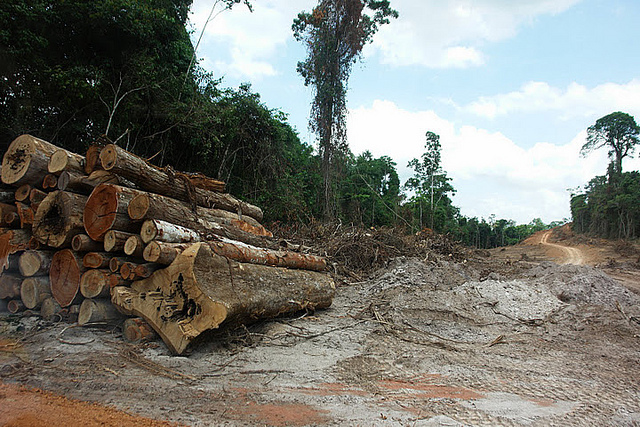Send to a friend
The details you provide on this page will not be used to send unsolicited email, and will not be sold to a 3rd party. See privacy policy.
[SÃO PAULO] Brazil is abandoning deforestation-control policies and lending political support to agricultural practices that will make it “impossible” to meet global climate targets.
This is the main conclusion of a study published in Nature Climate Change this month (July 9), which looked at the costs of political backtracking in environment governance.
A team of Brazilian researchers write that the changes led by president Michel Temer in a struggle to retain power and avoid responding to corruption accusations, compromise the country’s greenhouse gas emission targets set out in the 2015 Paris Agreement.
Brazil's commitment to the agreement includes restoring 12 million hectares of forests and achieving zero illegal deforestation in the Amazon by 2030, as well as strengthening compliance with the Forest Code, a legislation that establishes rules on where and how native vegetation may be explored.
“The government has abandoned the environmental agenda, and considering how things have gone so far I do not see how Brazil could be able to reach its greenhouse gas emission targets set out in the Paris Agreement”
Jose Marengo – Brazilian National Institute for Space Research
The country is the world’s seventh largest greenhouse gas emitter. Between 2005 and 2012, emissions were reduced by 54 per cent, mostly by cutting deforestation by 78 per cent.
However, since May 2016, president Temer has signed acts and decrees that jeopardise this trend, according to the researchers. This includes lowering environmental licensing requirements, which makes it easier for farmers to exploit new land indiscriminately; suspending the ratification of indigenous lands, which is generally associated with higher deforestation; and reducing the size of protected areas.
Between August 2015 and July 2016, almost 8,000 square kilometres of forest in the Amazon were lost, an increase in deforestation of 30 per cent compared to the same period of 2014 and 2015. As a result, greenhouse gas emissions increased by 9 per cent in the same period.
According to authors, this was done in exchange for political support from the powerful rural lobby, which holds almost 40 per cent of the seats in Brazilian Congress.
Their study evaluated the impact of these moves on Brazil’s capacity to fulfil its global commitments to keep the average rise in global temperature at no more than 2 degrees Celsius.
It used integrated assessment models to project the effort needed by other sectors of the economy to compensate for weak environmental governance and meet the Paris Agreement. These efforts were classified under three governance scenarios: weak, intermediate and strong.
The authors looked specifically at agriculture, livestock, energy production and consumption, waste and industrial process emissions.
According to their model, in order to compensate for increases in deforestation under the ‘weak’ scenario, these sectors would have to foot a bill of US$5.2 trillion by 2050. Alternatively, part of Brazil’s emissions reduction bill would fall to other countries.
The failure to compensate for emissions under that scenario stands even with the increase of ethanol production and its use as fuel for airplanes and vehicles.
Worrying scenarios
The ‘weak’ scenario is based on the period prior to 2005, when environmental governance was poor, with high rates of deforestation. The study found it would lead to annual losses of more than 27,000 square kilometres in the Amazon and 18,000 in the Cerrado (the Brazilian savannah) by 2025 — leading to 23.1 gigatons of carbon dioxide emitted into the atmosphere.
Under the ‘intermediate’ scenario — which assumes current deforestation control policies are maintained, and predatory practices on forests are encouraged, based on governance between 2012 and 2017— by 2030 the deforestation in the Amazon would reach 17,000 square kilometres, and 15,000 in the Cerrado, resulting in emissions of 16.3 gigatons of carbon dioxide.
And under the ‘strong’ scenario, the researchers found that annual deforestation in the Amazon and Cerrado would be reduced to less than 4,000 square kilometres by 2030, down from 7,989 and 9,483 square kilometres, respectively. This scenario is based on policies in place between 2005 and 2011, when governance improved and deforestation was reduced.
“Failure to meet [Brazil’s] targets would not just harm other countries, it would also affect other sectors of the economy,” said Roberto Schaeffer, an engineer at the Alberto Luiz Coimbra Institute for Graduate Studies and Research in Engineering at the Federal University of Rio de Janeiro, in an interview with SciDev.Net.
He pointed out that if Brazil fails to stay within its carbon dioxide budget requirement under this weak scenario, the rest of the world would need to reduce its emissions to compensate. Another option would be for Brazil to buy carbon credits from abroad to fulfil its global commitment
.However, José Marengo, a meteorologist at the Brazilian National Institute for Space Research, believes it is unrealistic to assume other sectors of the economy would compensate, or that the country has enough resources to buy the carbon credits needed to fulfil its part of the agreement.He said the findings are alarming and show the dangers of the country’s political moves.
“The government has abandoned the environmental agenda, and considering how things have gone so far I do not see how Brazil could be able to reach its greenhouse gas emission targets set out in the Paris Agreement,” said the researcher, who leads a global interdisciplinary network of climate change research and is unconnected to the study.
He added that the only way to prevent this from happening would be the next President, who will take office on January 1, 2019, to be fully committed to the environmental agenda, giving it the same weight as social-economic issues.
The project coordinated by José Marengo is supported by FAPESP, one of SciDev.Net’s donors.
This article has been produced by SciDev.Net's Latin America & Caribbean desk.














